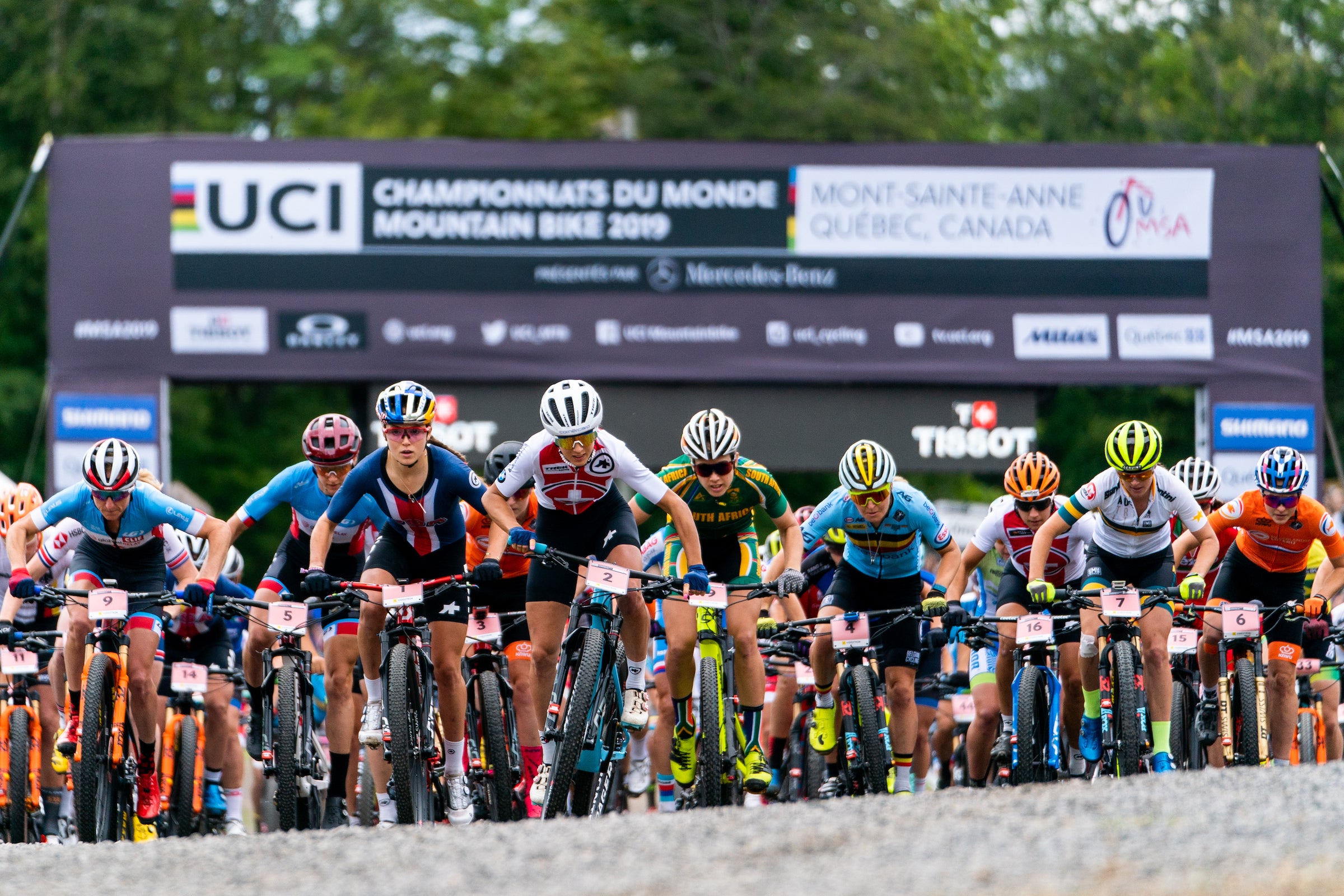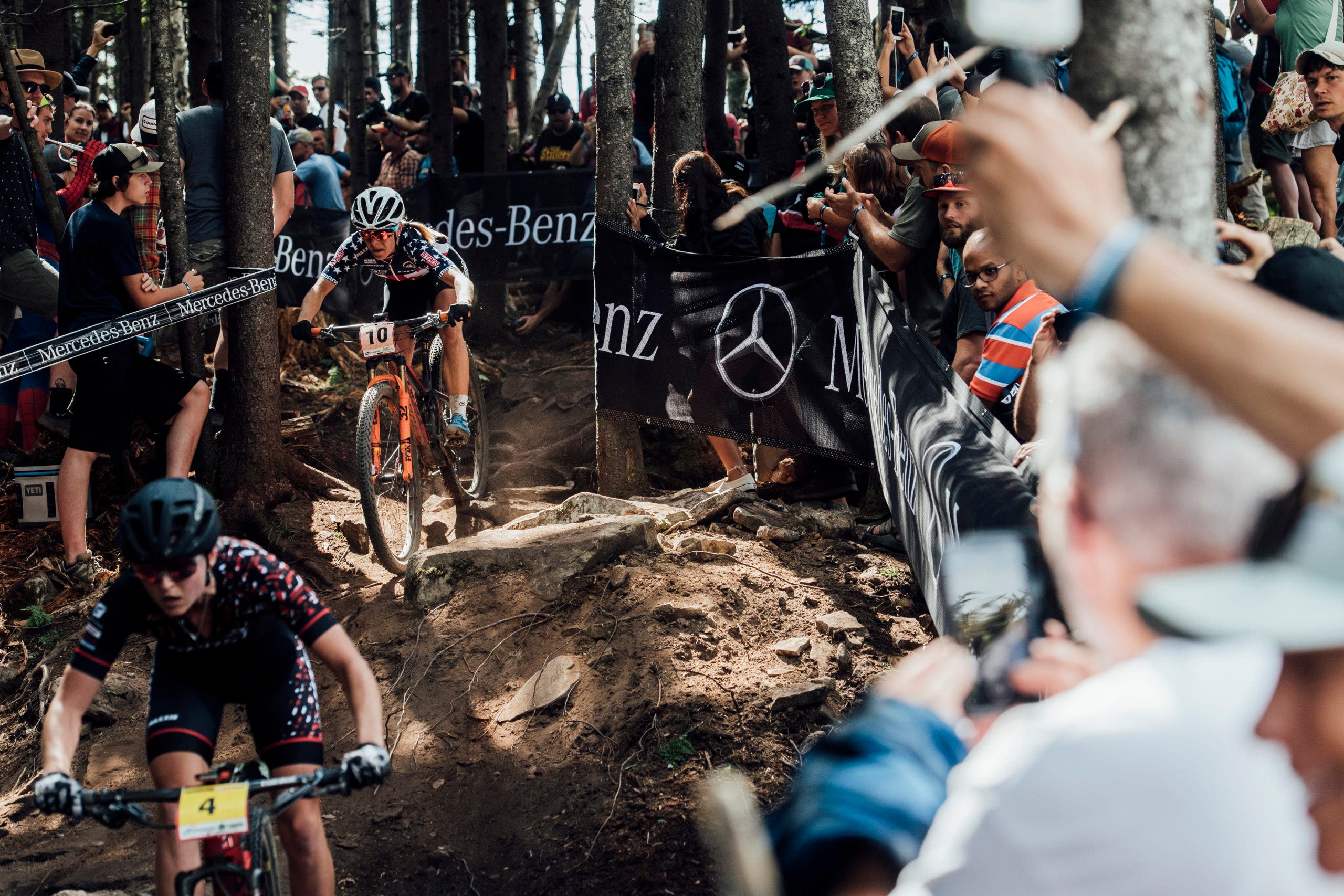An Olympic battle is brewing between MTB racers and the UCI. Here's why:

BEAUPRE, QC - AUGUST 31: Cyclists start the Women's Elite Cross-country Olympic distance race at the UCI Mountain Bike World Championships at Mont-Sainte-Anne on August 31, 2019 in Beaupre, Canada. (Photo by Dustin Satloff/Getty Images) *** Local Caption *** Kate Courtney, Jolanda Neff; Catharine Pendrel; Githa Michiels
At the start line of the mountain bike World Cup in Nové Město, Czech Republic this week, there will be a few notable absences. American riders Chloe Woodruff and Lea Davison both chose not to travel to Europe for the World Cup or world championships in Leogang, Austria; given the extenuating circumstances of COVID-19, there’s hardly a reason to ask why.
They aren’t the only ones — across the sport numerous mountain bike racers have opted to skip international competitions due to the threat of contracting and spreading the virus.
However, the decision to skip the upcoming races in Europe could put these riders at an enormous disadvantage for the upcoming battle to qualify for the Olympics.
That’s because the UCI recently made a controversial decision to re-open the yearlong cross-country mountain-bike rankings starting on July 1. The decision means that all major competitions now impact a rider’s spot in the frantic cross-country starting grid, where top starting positions are a tremendous advantage, and poor positions can create an insurmountable disadvantage. The decision has created a stir in the small world of Olympic XC racing, and now, the advocacy group The Cyclists’ Alliance has stepped in to try to give riders a say.
The problem is the points

Professional mountain bikers are familiar with the points chase, which becomes ever more fervent heading into an Olympic year. In 2020, that chase has been complicated by inequities in race opportunities due to COVID-19. While there was an initial consensus to cancel all events, some countries have now held their national championships, among other categories of races. For the athletes who haven’t had race opportunities, or perhaps more importantly, wouldn’t have felt comfortable lining up even if they technically could, there is a consequence.
They are missing out on points, and now face the real prospect of being at a tremendous disadvantage in the chase for the 2021 Olympics.
After Maja Włoszczowska, the athlete representative for mountain biking at the UCI was informed by the governing body that rankings would be reopened for cross country racers, she did exactly what her role is intended for: she communicated it to the riders via a Facebook group. The UCI never issued a formal press release, so riders were caught off guard.
“Next year’s starting position rules are really not settled,” she said. “As for now, reopened ranking is going on. And all UCI races (C1, C2, HC, S1, etc.) are using this reopened ranking.”
Many riders objected to the decision, and Włoszczowska relayed this back to the UCI. The governing body assured her that starting positions for the remaining races in 2020 would be determined only by points accrued up until March 3. The July date would only impact races next year. As for the Olympics?
“Earlier during discussion, we were ensured that Olympic starting position will be for sure [considered] in the fair rules for all,” Włoszczowsk said. “But from athletes points of view the current situation is really confusing. That’s why we did a survey and sent results to the UCI.”
Nevertheless, this still wasn’t good news for the athletes who either weren’t able, or simply didn’t want to, travel to any start lines until the uncertainty of living with COVID-19 was more certain.
The Cyclists’ Alliance steps in

Swiss marathon mountain biker Ariane Lüthi is part of the UCI MTB Athletes Facebook group and watched the reaction to the news of the ranking with interest. She also happens to sit on the eight-member rider council of The Cyclists’ Alliance (TCA), and saw the dilemma as a perfect opportunity for the advocacy group to get involved.
In fact, Lüthi’s own connection to the organization began when she was grappling with some issues specific to her own discipline.
“We don’t have a separate start as women,” Lüthi said. “Also, I’ve pushed for equal prize money. I was thinking, ‘Damn, I need some help, some support.’”
More commonly known for its advocacy for women who race on the road than on dirt, the support of TCA is available to any professional female cyclist. The organization provides legal and ethical counsel on issues like fair pay for female athletes, disputes with teams, and sexual misconduct.
To better understand why athletes were upset and confused about the reopening of rankings, Lüthi and the TCA created a survey. From mid-July to mid-August, 265 riders from 26 countries completed it. The results are now in, and they’ve been handed off to the UCI.
Engaging and inequitable
If points weren’t so important to cross country mountain bikers, Lüthi says, there likely wouldn’t have been such a heated response to the survey.
“Really, the points play a massive role to any XC rider,” she said. “We had a comments box in the survey, and I had riders saying ‘I planned my whole year, budget, etc, so I can collect the most points.”
In races, points are crucial to starting position, and starting position is crucial to winning. Winning, whether it’s a World Cup or a national competition, then puts you in a better position to qualify for the Olympics. Points reflect a system that Woodruff, the current American national champion, feels has both advantages and disadvantages.
“Rankings can keep people engaged and be motivating for racers and can give teams something to objectively evaluate racers,” she said. “I think there’s a benefit to having a ranking and points system but the challenge is making equitable opportunities to earn points.”
Many non-European riders see the rankings as a Sisyphean battle that’s basically always been that way. It wasn’t until 2017, when the UCI announced the addition of cross country short track races to the mountain bike World Cup program that some riders felt they’d been given a break.
“Suddenly athletes have an opportunity to race their way into the first or second start line which is huge,” Woodruff said. “It definitely takes work to get into top 40 to get into the short track race but that’s more doable.”
“I’m a good example of that. When short-track came along that was the first time I was able to jump into that first row.”
Survey results are in

Of the 265 riders who completed the TCA survey, 81 were from Canada and the United States. It was open to both male and female riders who made up 54 and 46 percent of respondents, respectively.
Lüthi said that, beyond the key question of whether respondents supported the UCI’s decision to reopen the rankings as of July 2020, the survey also addressed other important timely questions, as well.
Has or will your nation host a national championships in 2020? If so, have or will you attend? Regarding World Cups — if they are held — are you planning to race? Are you able to travel?
And, is COVID-19 still a concern that affects decision making?
“It came out very clearly that riders see it as very unfair that some people can collect points and others can’t,” Lüthi said. “It’s not just from countries that are on the back foot in this scenario but across the world. Obviously riders from the United States were a little bit louder, a bit more ‘This is really unfair,’ but to hear from Brazil and other countries, it’s good to know for the UCI.”
The survey showed that 76 percent of riders disagreed with the plan to reopen rankings as of July 1. The results were more nuanced on the issue of when racing actually should happen.
65 percent of riders believe that the rankings should stay frozen “until there are no restrictions and no risk for traveling in any country.” However, 11.5 percent selected “December 31, 2020,” and 11.1 percent chose “March 3, 2021” (a year after the rankings were temporarily closed due to the pandemic). 8.4 percent were fine with “now, or whenever the UCI decides.”
Without a perfect answer, Woodruff says she hopes that fairness wins in the end.
“I hope they’ll [the UCI] do their best to keep the riders’ interest in mind,” she said. “I’d like to be optimistic. But, it would hurt me if they decide to include all of these points and not allow racers to substitute from 2019.”
Despite what Woodruff stands to lose if points from this year count, she wasn’t willing to risk international travel during the pandemic unless it was absolutely necessary. She also said that she didn’t feel the races were critical to her preparation for Tokyo 2021.
“I‘m assuming we’ll have opportunities to race next year at a World Cup level,” she said.
The TCA survey’s questions on COVID-19 saw more variation in response. Riders main concern was being quarantined while traveling for races (40.6 percent). On a scale of how likely riders were to travel internationally for races, 22.8 percent responded that the likelihood was low, and 19.3 responded high. The rest were split between the middle.
After the results of the survey were collected, the UCI released its long-anticipated COVID-19 protocol for mountain bike racing. While that may have changed some riders survey responses, one anonymous comment suggests otherwise.
“The UCI is putting pressure on people to travel internationally which is banned or requires special permission from many countries. It is unethical. The UCI is placing its financial needs over that of the safety of the people around the world, its own staff, race organizers, and the riders and teams. We are all desperate to race but unfortunately, this is not the safe or responsible decision.”
Fairness for all
The coronavirus pandemic might be the overt complication to the reopening of rankings this summer, but it didn’t create the problem. Professional mountain bikers have long been dealing with a system that, despite its good intentions, doesn’t provide the most equal playing field.
“The thing that I have noticed with the UCI point system is the unequal opportunity to access UCI points races in different countries,” American pro Haley Batten told VeloNews. “Some countries have more of these race opportunities to collect points, which give an advantage for start position at important events.”
Batten chose to travel to race in Europe this summer, not to collect points but to seek opportunities for development and training. She was one of the riders who completed The Cyclists’ Alliance survey and said she was moved by how much of a consensus there was among athletes on the fairness of reopening rankings amidst an ongoing global pandemic.
“We are all in this situation together, and I believe that the UCI needs to make choices that consider all the athletes and countries involved in the sport,” she said.
Nowhere will the UCI’s decision have more of an impact than in who ultimately qualifies for Tokyo.
While The Cyclists’ Alliance and the professional mountain bike community await the UCI’s response to the survey, some of the world’s best riders will be lining up in Nové Město and Leogang in the upcoming days. Some of them have opted to stay home.
As the survey says, the points shouldn’t matter this time.